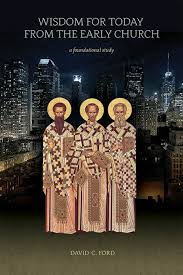|
|||
|---|---|---|---|
| This weekly bulletin insert complements the curriculum published by the Department of Christian Education of the Orthodox Church in America. This and many other Christian Education resources are available at http://dce.oca.org. | |||

The Church commemorates some of the great Fathers of the early Church, particularly Gregory the Theologian, John Chrysostom, and Basil the Great. These three bishops and theologians of the late fourth century, who lived in Asia Minor and Constantinople, grace the cover of a book entitled "Wisdom for Today from the Early Church: A Foundational Study" by Dr. David C. Ford (St. Tikhon's Monastery Press, 2014). The author says that he chose to feature them there "as being representative of all the Saints of the first several centuries of the Christian era – who together, by the grace of the Holy Spirit, made possible the forging of the Christian world." The first chapter of the book offers an Orthodox Understanding of the Book of Acts. It gives the Orthodox reader an invaluable perspective, showing how Acts is the basis of the Church's practice and physical structure. Going verse by verse, Dr. Ford provides insights that won't be found in many other commentaries. For example, he writes about verses 3: 1-3, in which Peter and John go to the temple at the hour of prayer, that the ethnically-Jewish early Christians continued their venerable practice of worshipping four times a day. He then adds that the Orthodox Church, to this day, "has services called the Hours, one for each of these four times." Dr. Ford deftly interweaves events in today's Church with Acts, as well. Writing about verses 9:3-6, in which Christ appears to Saul on the road to Damascus, he describes the contemporary vision of Christ experienced by Daniel Byantoro, a young Muslim, who became the first Indonesian Orthodox convert and later priest and apostle to his homeland. Chapter 2 carries on the story of the early Church after Acts, telling how the apostolic fathers encouraged and taught the faithful. Dr. Ford describes and quotes from several of these early Fathers, again giving insights that may be new to many readers, and will be valuable to all. From "The Letter to Diognetus", written by an unknown author to someone inquiring about the Christian faith, he takes these words describing the life of believers: "For they dwell in their own countries, but only as sojourners; they bear their share in all things as citizens, and they endure all hardships as strangers ...They marry like all other men and they beget children, but they do not cast away their offspring. They have meals in common, but not their wives." The "otherness" of Christians has often been described, but this description is particularly memorable. The remaining chapters, taking the reader through several more centuries of Church history, are filled with relevant quotations and comments. The writing is appealingly simple but still scholarly, telling the Church's story in ways that encourage reflection and further study. The book's Orthodox perspective adds another layer of enjoyment and value for those who want to learn more about the complicated, fascinating history of the Church. |
|||
